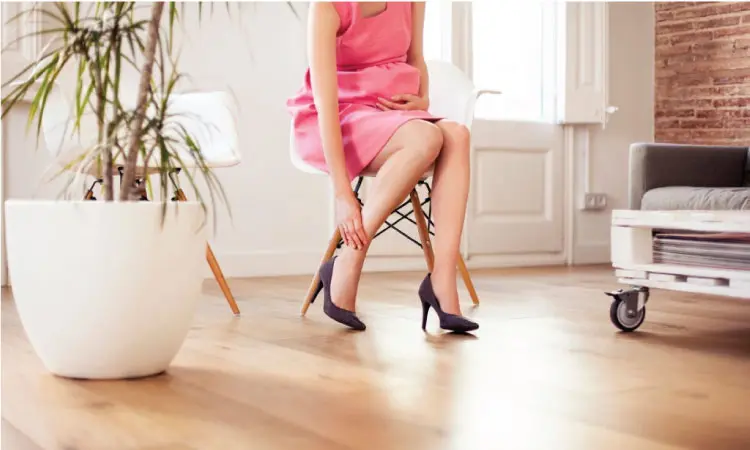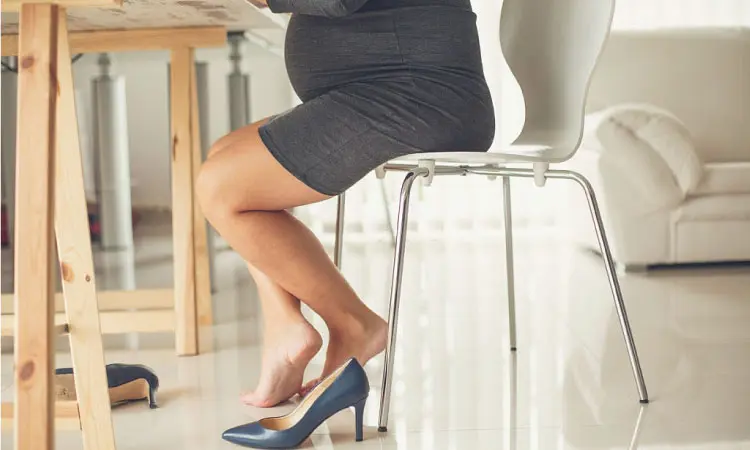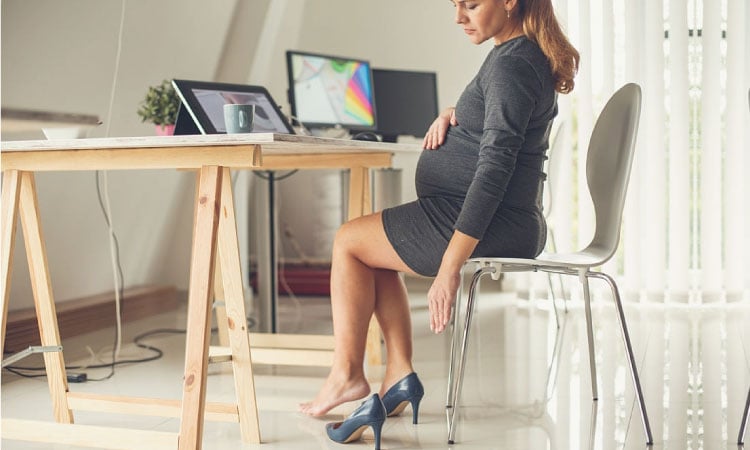During pregnancy, not only what you eat but what you wear also plays an important role in the safe progression of the pregnancy. Women who used to wear high heels always wonder if wearing heels during pregnancy is okay or not.
Let us evaluate the potential risks of wearing heels during pregnancy. We also provide some tips to ensure safety while wearing high heels on a special occasion during pregnancy.
Is It Okay To Wear High Heels While Pregnant?
Many women wear heels throughout their nine months of pregnancy without any major issues. But wearing high heels during pregnancy, in general, is not at all recommended by health experts.
According to our panel gynecologist Dr Ankita Patel Tayal, during pregnancy, hormonal changes bring about various significant changes in a woman’s body. And these changes heighten as the pregnancy progresses. Even the center of gravity of the body starts to shifts from the second trimester.
As the hormone relaxin urges in, the ligaments and muscles start to soften, and all joints, including the leg, become less stable. This is why pregnant women start to walk differently as the pregnancy progresses. She has to balance the joint instability, muscle strains, and growing belly.
Wearing heels during pregnancy poses a number of risks to both mother and baby. One of the most important risks of wearing high heels during pregnancy is the increased chance of falls during pregnancy.
A fall during pregnancy could affect the healthy progression of the pregnancy.
Can Wearing Heels During Pregnancy Cause Miscarriage?

Dr Ankita Patel Tayal, practising obstetrician for last 10 years, assures that even though wearing heels during pregnancy could cause some uneasiness like pains and aches, simply wearing heels will not bring about a miscarriage. However, wearing heels increases the risk of fall that in turn increases the risk of miscarriage.
Calculate Due Date With LMP
Falling is always a threat to the pregnancy. Many women avoid wearing heels during pregnancy because they do not want to take the huge risk.
Wearing high heels during first trimester of pregnancy
Wearing heels during the 1st trimester of pregnancy is relatively safe and okay. But it is always wise to invest in a sturdier heel or wedge during the first trimester so that you will be more comfortable and more balanced.
Related Reading: How To Cope With Extreme Tiredness In Early Pregnancy
One of the common queries of pregnant women is “when to stop wearing high heels during pregnancy.” Well, most of the experts insist not to wear heels beyond the first trimester to ensure the safety and health of the mother and baby in the womb.
Wearing high heels during third trimester of pregnancy
During the third trimester, most of the physical strains, pains, aches, issues like edema (swollen feet) heighten. The joints will also be clumsier as the relaxin hormone level is also high during this stage.
Wearing restrictive heels at this point will increase the existing pains and aches. You are also at a higher risk of losing balance and trip. All these increase the risk of serious complications towards the end of pregnancy.
Therefore, when it comes to the third trimester of pregnancy, it is always wise to listen to your body than your fashion needs. Abstain from wearing heels during this time.
Risks Associated With Wearing High Heels During Pregnancy

Some of the important ill-effects of wearing high heels during pregnancy are as follows:
1. High heels during pregnancy bring about cramps in the calf muscle
Regular use of high heels during pregnancy can adversely affect your calf muscles. This is because, while wearing high heels, calf muscle will be continuously placed in a shortened position.
Staying in this position continuously can result in tightening of the calf muscle. This, in turn, triggers calf muscle cramps. Already the pregnant women are prone to calf muscle cramps for n number of other reasons.
Wearing heels, thus, could worsen calf pain. This sudden, sharp, and stabbing pain in the back of the calf during pregnancy is extremely painful.
2. Heels can cause back pain
Wearing heels alters the posture, pregnant or not. Actually, the purpose of wearing heels is to give the woman’s back a more defined look. When you wear heels, your pelvic muscles bend forward.
This increases the curves in the lower back, thereby giving your back a more prominent look. At the same time, this posture change for a long time can take a toll on your back as well.
Related Reading: 10 Drinks To Avoid During Pregnancy
During pregnancy, your center of gravity shifts due to the growing midsection. This will alter your posture by pulling you forward even without any footwear. Wearing heels during pregnancy could result in excessive forward bending and lower back curving.
This could, thus, double the stress on your back. This can trigger or aggravate back pain during pregnancy.
Moreover, during pregnancy, the lower back ligaments also get loose along with other ligaments and muscles. Therefore, these ligaments may not be able to support the back efficiently. Thus, wearing the wrong footwear could aggravate back pain during pregnancy.
3. Increases risk of losing balance and tripping over
During pregnancy, as already mentioned, ligaments in the joint will be highly relaxed and flexible instead of being strong and firm. The ankle strength, therefore, will not be up to mark. Shifting in the center of gravity and putting on weight during pregnancy further takes a toll on the strength of the ankle.
All these already have an adverse effect on pregnant women’s balancing capacity, stability, and posture. Heels, especially tall and pointed heels, require an incredible skill of balancing.
Pregnancy weakens the ankle and reduces the ability to balance. Therefore, wearing high heels during pregnancy increases the risk of tripping and falling over.
4. Aggravates edema
Swelling in legs, edema is a common issue during pregnancy. Edema starts to appear during the second trimester and aggravates during the third trimester. This condition is caused due to fluid retention and poor blood circulation during pregnancy
Walking or standing for a long time on tight heels aggravates edema as more fluids tend to accumulate because the circulation is hindered. This also increases the pain and uneasiness due to edema.
5. Wearing heels during pregnancy can cause pain in the heels
As pregnancy progresses, a woman gains weight, and as a result, the arched portion of the heel flattens and starts touching the ground. Wearing high heels distribute the weight unevenly in the feet. They also place the arch of feet in an atypical position.
This could strain the arch of heels and trigger heel pain. Studies proved that the increased pressure on your heels from wearing high heels could contribute to plantar fasciitis, which can cause intense heel pain.
Footwear That One Should Wear During Pregnancy
Wearing comfortable footwear is very important during pregnancy. During pregnancy, especially during the second and third trimester, always choose comfort and safety over fashion.
Try to choose footwear that will not promote fluid accumulation in the feet. Also, make sure the footwear you choose helps you to balance yourself well. Choose footwear with a supportive arch and a firm heel. Try to choose footwear that provides extra shock absorption and is light on the feet.
Related Reading: Sitting Cross-Legged During Pregnancy – Is It Safe
It is better to choose easy to wear and remove footwear during pregnancy. Footwear with flat soles is the best option. Footwear with Velcro, elastic straps, and laces will be supportive and easy to wear.
Similarly, choose footwear that has a wider toe area. It is always better to have a 1-centimeter gap between the longest toe and the end of the shoe. When it comes to pregnancy, flat shoes are the best bet on a daily basis as they minimize the strain on the back.
If you want to wear heels, it is always good to wear wedges during pregnancy as they provide extra balance and comfort. Besides, wedges fall technically under the high heel category, thereby satisfying the requirement of heels.
Note: During pregnancy, your feet tend to swell during the day. Therefore, it is always wise to buy shoes later in the afternoon when your feet are at their largest. This will make sure the footwear will not be tight on your feet at any point in time.
Safety Tips for Wearing Heels During Pregnancy

Now you know more than a few risks associated with wearing high heels during pregnancy. However, despite these risks, if you want to wear heels occasionally during pregnancy, you might want to keep the safety tips given below in mind:
1. Never wear thin pointed heels
Never wear shoes with thin and pointed heels during pregnancy. Instead, you can choose wedges or block heels that provide better support and balance.
2. Invest in good shoes
During pregnancy, it is important to buy durable footwear of a good brand. Cheaper heels will not be strong enough to bear your pregnancy weight. They may break at any moment making you trip and increase the risk of falling down. Therefore invest in shoes that fit comfortably in your feet, even if the cost is higher.
3. Never overdo wearing heels during pregnancy
While you are on heels, never stand or walk for a long duration. Sit down whenever possible. This will help to keep the pressure off your ankles. Try not to wear heels for more than two hours at a stretch. Also, never wear heels every day.
Related Reading: Household Work During Pregnancy – What Do And What To Avoid
4. Relax the feet whenever possible
Whenever you feel a little strain while wearing high heels, try to stretch your calves and ankles. Also, sit somewhere comfortably and gently massage your feet.
In case you have to wear heels during the entire day, remember to take them off for a while, relax your feet, and then put them on again. These short breaks help to restore circulation, reduce swelling and discomfort.
5. Feeling pain? Take your heels off immediately

Whenever you feel pain in your legs or lower back while wearing high heels, just take the heels off. Always carry a pair of flats or low heel shoes with you. Switch the shoes whenever you feel you can’t walk or stand on your heels.
Conclusion
Wearing heels during pregnancy directly causes no pregnancy complications. However, we should not overlook the increased risk of losing balance and tripping. Also, you should count on the discomfort and pain it could cause to your swollen feet during pregnancy.
Pregnancy is a time you should take all measures to keep yourself comfortable. It’s only a nine-month journey. So stay away from wearing high heels. After all, a pair of fashionable heels are not worthy of risking your pregnancy. So think twice before adding height during pregnancy. It is always wise for soon-to-be moms to let go of their ‘tall statement.’


